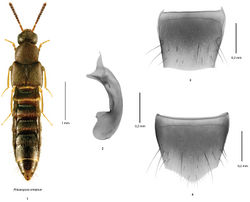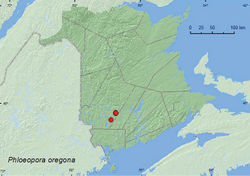Difference between revisions of "Phloeopora oregona"
m (Imported from ZooKeys) |
m (1 revision) |
(No difference)
| |
Latest revision as of 09:41, 26 April 2012
| Notice: | This page is derived from the original publication listed below, whose author(s) should always be credited. Further contributors may edit and improve the content of this page and, consequently, need to be credited as well (see page history). Any assessment of factual correctness requires a careful review of the original article as well as of subsequent contributions.
If you are uncertain whether your planned contribution is correct or not, we suggest that you use the associated discussion page instead of editing the page directly. This page should be cited as follows (rationale):
Citation formats to copy and paste
BibTeX: @article{Webster2012ZooKeys186, RIS/ Endnote: TY - JOUR Wikipedia/ Citizendium: <ref name="Webster2012ZooKeys186">{{Citation See also the citation download page at the journal. |
Ordo: Coleoptera
Familia: Staphylinidae
Genus: Phloeopora
Name
Phloeopora oregona Casey, 1906*** – Wikispecies link – Pensoft Profile
Material examined
Canada, New Brunswick, York Co., Charters Settlement, 45.8340°N, 66.7450°W, 14.V.2004, R. P. Webster coll., mixed forest, in wood pile under bark of spruce (1 ♂, 1 sex undetermined, RWC); same data except 45.8188°N, 66.7460°W, 16.IV.2005, R. P. Webster coll., clearcut, under bark of white pine log (1 ♂, LFC); same locality data and collector except 45.8286°N, 66.7365°W, 3.VI.2007, 6.VI.2007, mature red spruce and red maple forest, under scolytid infested bark of red spruce (1 ♂, 2 ♀, 1 sex undetermined, RWC); 15 km W of Tracy, off Rt. 645, 45.6848°N, 66.8821°W, 26.IV–0.V.2010, R. Webster & C. MacKay, coll., old red pine forest, Lindgren funnel trap (1 ♀, RWC).
Collection and habitat data
In New Brunswick, adults were found in a mixed forest, a mature red spruce (Picea rubens Sarg.) and red maple forest, and in an old red pine (Pinus resinosa Ait.) forest. Specimens were taken from under bark of spruce and white pine (Pinus strobus L.), and under bark of red spruce infested with Scolytinae. One individual was captured in a Lindgren funnel trap. Specimens were collected during April, May, and June.
Distribution in Canada and Alaska
NB (new Canadian record).This specieswas, until now, only known from the type locality (The Dalles) in Oregon (Casey 1906[1]). We suspect that it is broadly distributed and transcontinental in North America. It is rare in collections, probably due to cryptic habitat associations.
Comments
Author JK examinedthetype material ofthe following species: Phloeopora arctica Lohse, Phloeopora corticalis (Gravenhorst), Phloeopora ferruginea Casey, Phloeopora liberta Casey, Phloeopora oregona Casey, Phloeopora sublaevis Casey, Phloeopora scriba Eppelsheim, and Phloeopora testacea (Mannerheim). All species of this genus are similar externally to each other and differ in small details such as body proportions (e.g., width of pronotum, length of elytra), density of punctation and pubescence on forebody, body color, and shape of the apical part of median lobe of aedeagus in lateral view. The shape of the median lobe of aedeagus in specimens from New Brunswick is similar to that of Palaearctic Phloeopora corticalis and Nearctic Phloeopora oregona, but externally is more similar to Phloeopora oregona and Phloeopora testacea, which have dense pronotal punctation and pubescence, and are less glossy than Phloeopora corticalis. The median lobe of aedeagus is strongly produced ventrally at apex in Phloeopora corticalis and Phloeopora oregona and less so in the other species. We tentatively affiliate the New Brunswick specimens with Phloeopora oregona and suspect that this species is transcontinental in distribution in North America.
Taxon Treatment
- Webster, R; Klimaszewski, J; Sweeney, J; DeMerchant, I; 2012: New Staphylinidae (Coleoptera) records with new collection data from New Brunswick, and an addition to the fauna of Quebec, Canada: Aleocharinae ZooKeys, 186: 83-118. doi
Other References
- ↑ Casey T (1906) Observations on the staphylinid groups Aleocharinae and Xantholinini, chiefly of America. Transactions of the Academy of Sciences of St. Louis 16: 125-434.
Images
|

